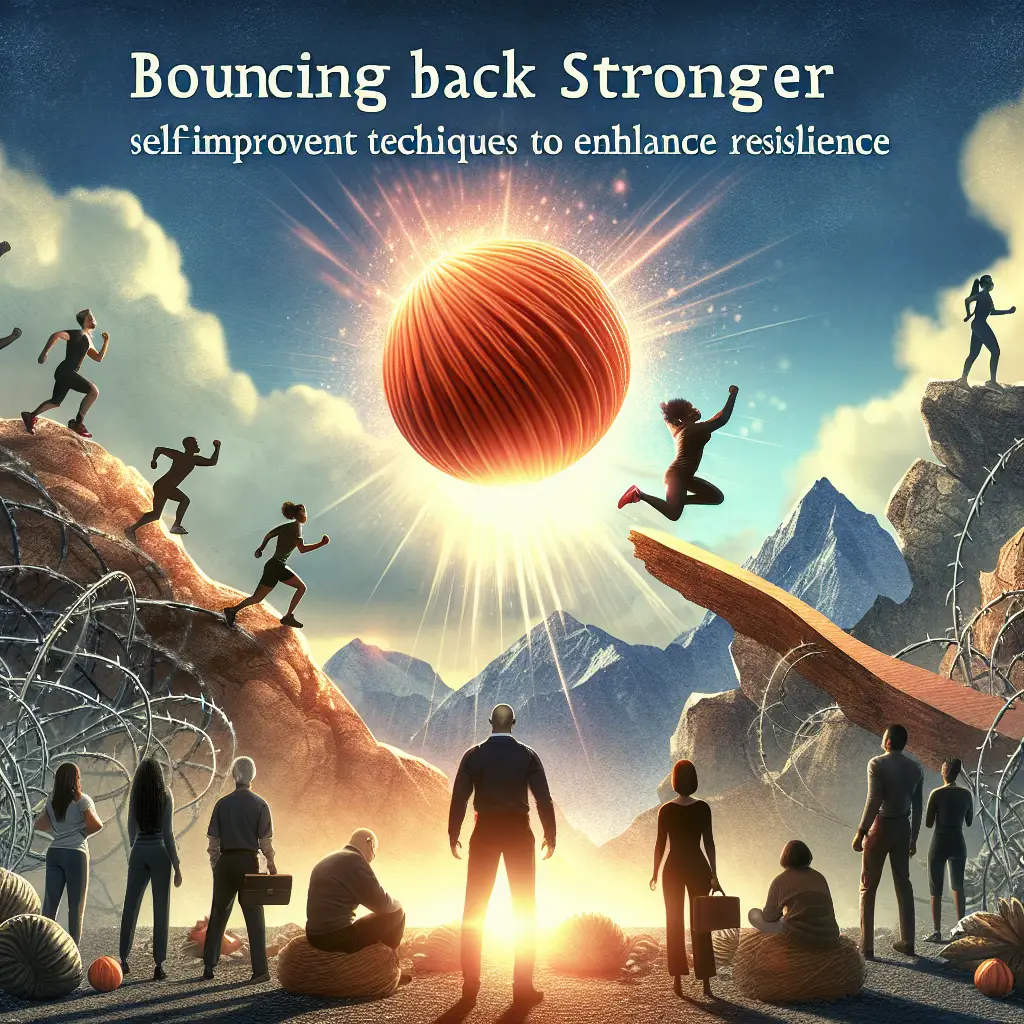
Bouncing Back Stronger: Essential Self-Improvement Techniques to Enhance Resilience
Introduction
In a world that often feels like a chaotic whirlwind, the ability to bounce back stronger than before is not just a desirable trait; it’s an essential survival skill. Think about it: life is replete with challenges—be it personal setbacks, professional failures, or unexpected crises. Resilience acts as our fortress, empowering us to face adversity head-on and emerge unscathed, sometimes even thriving in the aftermath.
This article dives deep into "Bouncing Back Stronger: Self-Improvement Techniques to Enhance Resilience." We will explore actionable strategies, real-life case studies, and valuable insights that can help you cultivate an unshakeable resilience in your life. Whether you’re navigating a professional setback, personal hardship, or just the everyday challenges that life throws your way, this comprehensive guide aims to provide you with the tools you need to stand strong and emerge victorious.
Understanding Resilience
What is Resilience?
Resilience is often defined as the capacity to recover quickly from difficulties. However, it goes beyond just bouncing back from setbacks. It involves a process of adaptation that allows individuals to not only cope with adversity but to grow stronger because of it. Many psychologists argue that resilience combines several aspects such as mental toughness, emotional awareness, and the ability to manage stress effectively.
The Importance of Resilience
Why is resilience so crucial in our lives? Studies suggest that resilient people are generally happier, healthier, and more successful in their endeavors. They tend to engage in more meaningful relationships, maintain a positive outlook, and exhibit grittier determination in the face of challenges. According to the American Psychological Association, resilience can significantly mitigate the impact of stress on both mental and physical health, making it a vital skill for everyone to develop.
Bouncing Back Stronger: Self-Improvement Techniques to Enhance Resilience
1. Mindfulness and Meditation
The Power of Present Awareness
Mindfulness is more than just a buzzword; it’s a powerful technique for enhancing resilience. Incorporating mindfulness practices into your daily routine can help you remain grounded, particularly during turbulent times. Research shows that mindfulness meditation can reduce anxiety, improve emotional regulation, and increase overall well-being.
Case Study: A Corporate Leader’s Transformation
Consider a corporate leader, Sarah, who faced extreme stress in her high-paced job. After integrating mindfulness and meditation into her daily routine, she reported a significant reduction in stress levels, improved focus, and healthier responses to workplace challenges. Sarah learned how to pause and assess situations more clearly before reacting, ultimately transforming her leadership style.
2. Cognitive Behavioral Techniques
Reframing Negative Thoughts
Cognitive Behavioral Therapy (CBT) provides essential tools for reshaping negative thinking patterns. Learning to identify cognitive distortions—such as catastrophizing or black-and-white thinking—can be transformative in your journey of resilience.
Case Study: Jason’s Journey of Change
Jason, a graphic designer, battled severe self-doubt that affected his professional output. By employing CBT techniques to identify and amend his negative thought patterns, he was able to approach challenges more positively. Jason even created a "thought journal" to document and challenge his negative beliefs, which ultimately allowed him to bounce back stronger after setbacks.
3. Building Strong Relationships
The Role of Social Connections
An essential foundation for resilience is our support network. Developing strong, positive relationships with friends, family, and colleagues fosters a sense of belonging and security. When challenges arise, having people to lean on can make all the difference.
Graph: Impact of Social Support on Resilience
| Type of Social Support | Impact on Resilience |
|---|---|
| Emotional Support | High |
| Informational Support | Moderate |
| Tangible Support | Low |
Analysis: The table illustrates that emotional support is the most influential type of social support when it comes to enhancing resilience.
4. Developing a Growth Mindset
Viewing Challenges as Opportunities
A growth mindset—the belief that one’s abilities and intelligence can be developed—can greatly contribute to resilience. Embracing challenges as learning experiences rather than obstacles allows us to persist in the face of adversity.
Case Study: The Athlete’s Experience
Meet Alex, a college athlete who faced significant injuries during a crucial season. Instead of succumbing to despair, Alex adopted a growth mindset, viewing his recovery as an opportunity to focus on different aspects of his sport. His positive outlook not only helped him recover but ultimately improved his performance when he returned to play.
5. Goal Setting and Visioning
Creating a Roadmap for Success
Setting specific, measurable, achievable, relevant, and time-bound (SMART) goals can help create a sense of purpose. This gives you direction, enabling you to stay focused on your objectives even when faced with challenges.
Table: SMART Goals Framework
| Component | Description | Example |
|---|---|---|
| Specific | Clearly define the goal | "I want to improve my public speaking skills." |
| Measurable | Track progress | "I will deliver two presentations monthly." |
| Achievable | Make sure it’s realistic | "I can manage practicing weekly." |
| Relevant | Align with broader life goals | "This skill will help me in my career." |
| Time-bound | Set a deadline | "I will achieve this in six months." |
6. Physical Well-Being
The Mind-Body Connection
Physical health plays a crucial role in our mental resilience. Regular exercise, proper nutrition, and Quality Sleep enhance our overall well-being and equip us to handle stress more effectively.
Case Study: The Busy Entrepreneur
Emily, a busy entrepreneur, ignored her health while building her business. Over time, she felt overwhelmed and burned out. After prioritizing regular exercise and a balanced diet, she reported increased energy levels, sharper focus, and an improved ability to handle stress. Emily’s experience underscores the importance of taking care of our physical well-being to foster resilience.
7. Learning from Failures
Viewing Setbacks as Stepping Stones
Rather than allowing failures to define you, embrace them as opportunities for growth. Analyzing what went wrong and what can be improved is key to bouncing back stronger.
Case Study: The Tech Startup
A tech startup experienced a significant product launch failure that initially devastated the team. Instead of giving up, they conducted a thorough analysis of their missteps, refining their approach for the next launch. This time around, they not only succeeded but exceeded their initial projections, proving the adage that setbacks can fuel success.
Conclusion
Resilience isn’t merely something we’re born with; it’s a skill we can cultivate. By incorporating these self-improvement techniques into your life, you can enhance your resilience, empowering you to confront challenges with confidence and vitality. Always remember that bouncing back stronger involves both a mindset shift and actionable steps toward personal growth.
As you embark on your journey of resilience, take each setback as a lesson, each challenge as an opportunity, and remain committed to your path of self-improvement. After all, it’s not about avoiding difficulties but mastering how to rise and thrive despite them.
FAQs
1. What is the best way to build resilience?
Building resilience involves developing a varied toolkit of strategies, including mindfulness, cognitive restructuring, strong social connections, and physical well-being practices.
2. Can resilience be learned?
Yes, resilience can be developed over time through practice and the implementation of self-improvement techniques.
3. How can I apply a growth mindset in my daily life?
To apply a growth mindset, shift your perspective on challenges, embrace effort, seek feedback, and view failures as opportunities for growth.
4. What role do relationships play in resilience?
Strong relationships provide emotional support, foster a sense of belonging, and offer different perspectives that can help in coping with adversity.
5. How does physical health impact resilience?
Physical health affects mental well-being; regular exercise, proper nutrition, and adequate sleep improve our ability to manage stress and cope with challenges.
In summary, as you navigate the complexities of life, remember that the journey towards "Bouncing Back Stronger: Self-Improvement Techniques to Enhance Resilience" is ongoing. Equip yourself with these tools, stay committed to growth, and discover the immense strength that lies within you.

















